Sustainable Tourism Planning and Development in Qatar
VerifiedAdded on 2021/01/01
|19
|5585
|458
Report
AI Summary
This report analyzes sustainable tourism development within the context of Qatar, examining the benefits of tourism planning for various stakeholders, including the government, local communities, and international tourism consultancies. It explores the advantages and disadvantages of public-private partnerships in tourism planning, providing examples relevant to Qatar. The report delves into the features of tourism development planning at different levels, such as national, international, and destination levels, and highlights the importance of interactive planning systems and procedures. Furthermore, it evaluates various methods for measuring the impact of tourism on the environment, society, and economy, including environmental impact assessments, social measures, and economic models like the Cambridge and STEAM models. Finally, the report defines the concept of sustainability in tourism development, emphasizing the need to meet the needs of the present without compromising the ability of future generations to meet their own needs. The report concludes by emphasizing the importance of sustainable practices for the long-term success of the tourism industry in Qatar.
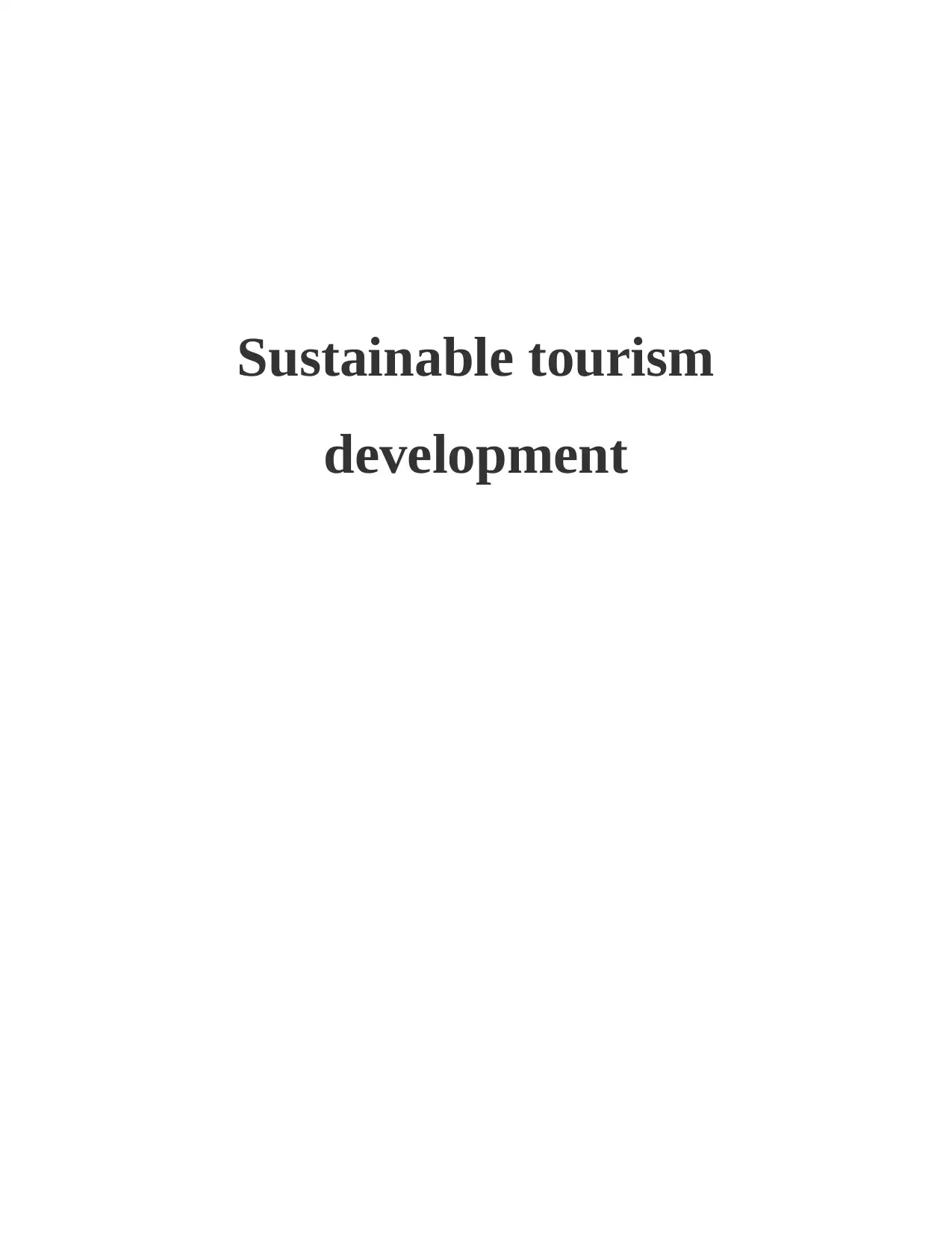
Sustainable tourism
development
development
Paraphrase This Document
Need a fresh take? Get an instant paraphrase of this document with our AI Paraphraser
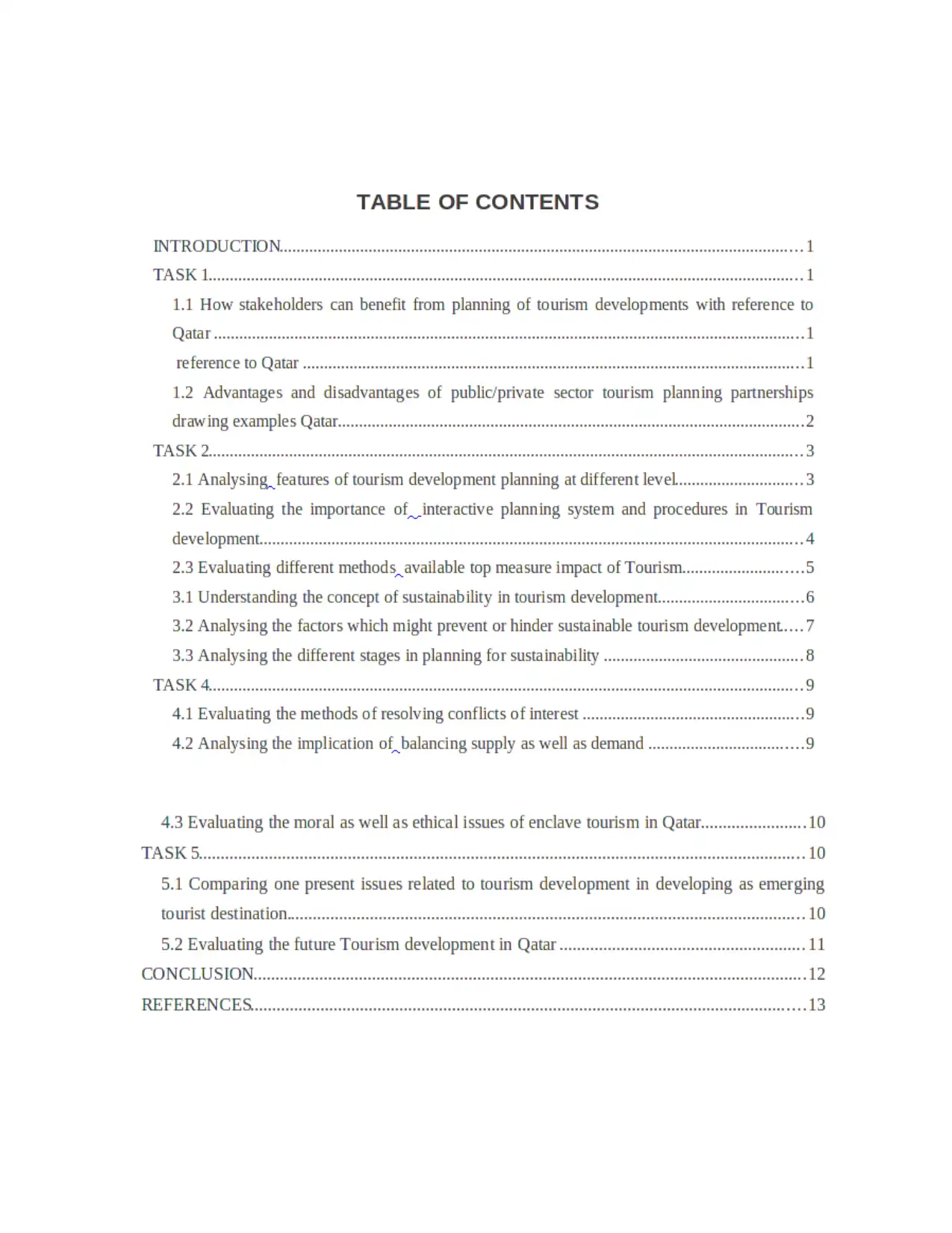
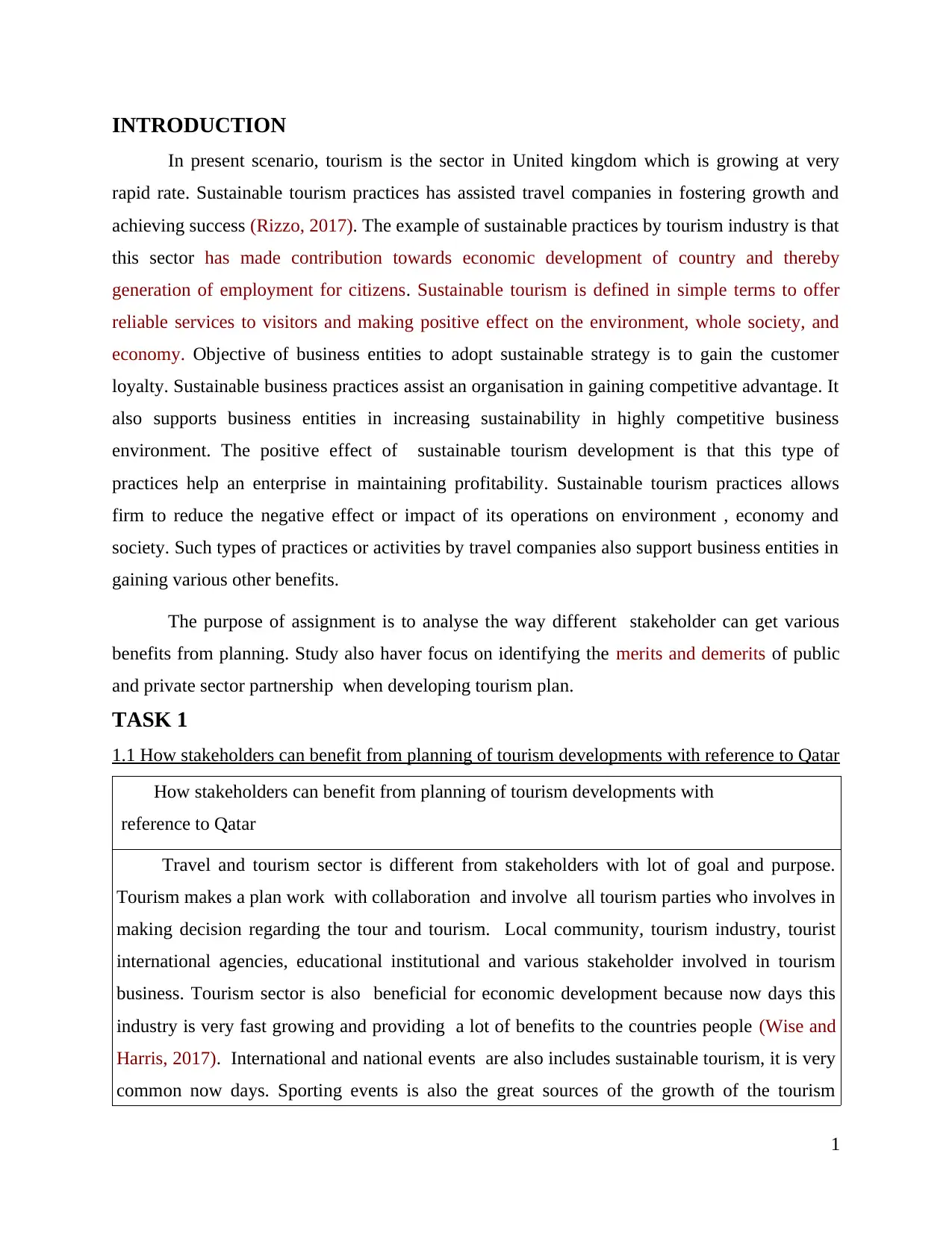
INTRODUCTION
In present scenario, tourism is the sector in United kingdom which is growing at very
rapid rate. Sustainable tourism practices has assisted travel companies in fostering growth and
achieving success (Rizzo, 2017). The example of sustainable practices by tourism industry is that
this sector has made contribution towards economic development of country and thereby
generation of employment for citizens. Sustainable tourism is defined in simple terms to offer
reliable services to visitors and making positive effect on the environment, whole society, and
economy. Objective of business entities to adopt sustainable strategy is to gain the customer
loyalty. Sustainable business practices assist an organisation in gaining competitive advantage. It
also supports business entities in increasing sustainability in highly competitive business
environment. The positive effect of sustainable tourism development is that this type of
practices help an enterprise in maintaining profitability. Sustainable tourism practices allows
firm to reduce the negative effect or impact of its operations on environment , economy and
society. Such types of practices or activities by travel companies also support business entities in
gaining various other benefits.
The purpose of assignment is to analyse the way different stakeholder can get various
benefits from planning. Study also haver focus on identifying the merits and demerits of public
and private sector partnership when developing tourism plan.
TASK 1
1.1 How stakeholders can benefit from planning of tourism developments with reference to Qatar
How stakeholders can benefit from planning of tourism developments with
reference to Qatar
Travel and tourism sector is different from stakeholders with lot of goal and purpose.
Tourism makes a plan work with collaboration and involve all tourism parties who involves in
making decision regarding the tour and tourism. Local community, tourism industry, tourist
international agencies, educational institutional and various stakeholder involved in tourism
business. Tourism sector is also beneficial for economic development because now days this
industry is very fast growing and providing a lot of benefits to the countries people (Wise and
Harris, 2017). International and national events are also includes sustainable tourism, it is very
common now days. Sporting events is also the great sources of the growth of the tourism
1
In present scenario, tourism is the sector in United kingdom which is growing at very
rapid rate. Sustainable tourism practices has assisted travel companies in fostering growth and
achieving success (Rizzo, 2017). The example of sustainable practices by tourism industry is that
this sector has made contribution towards economic development of country and thereby
generation of employment for citizens. Sustainable tourism is defined in simple terms to offer
reliable services to visitors and making positive effect on the environment, whole society, and
economy. Objective of business entities to adopt sustainable strategy is to gain the customer
loyalty. Sustainable business practices assist an organisation in gaining competitive advantage. It
also supports business entities in increasing sustainability in highly competitive business
environment. The positive effect of sustainable tourism development is that this type of
practices help an enterprise in maintaining profitability. Sustainable tourism practices allows
firm to reduce the negative effect or impact of its operations on environment , economy and
society. Such types of practices or activities by travel companies also support business entities in
gaining various other benefits.
The purpose of assignment is to analyse the way different stakeholder can get various
benefits from planning. Study also haver focus on identifying the merits and demerits of public
and private sector partnership when developing tourism plan.
TASK 1
1.1 How stakeholders can benefit from planning of tourism developments with reference to Qatar
How stakeholders can benefit from planning of tourism developments with
reference to Qatar
Travel and tourism sector is different from stakeholders with lot of goal and purpose.
Tourism makes a plan work with collaboration and involve all tourism parties who involves in
making decision regarding the tour and tourism. Local community, tourism industry, tourist
international agencies, educational institutional and various stakeholder involved in tourism
business. Tourism sector is also beneficial for economic development because now days this
industry is very fast growing and providing a lot of benefits to the countries people (Wise and
Harris, 2017). International and national events are also includes sustainable tourism, it is very
common now days. Sporting events is also the great sources of the growth of the tourism
1
⊘ This is a preview!⊘
Do you want full access?
Subscribe today to unlock all pages.

Trusted by 1+ million students worldwide
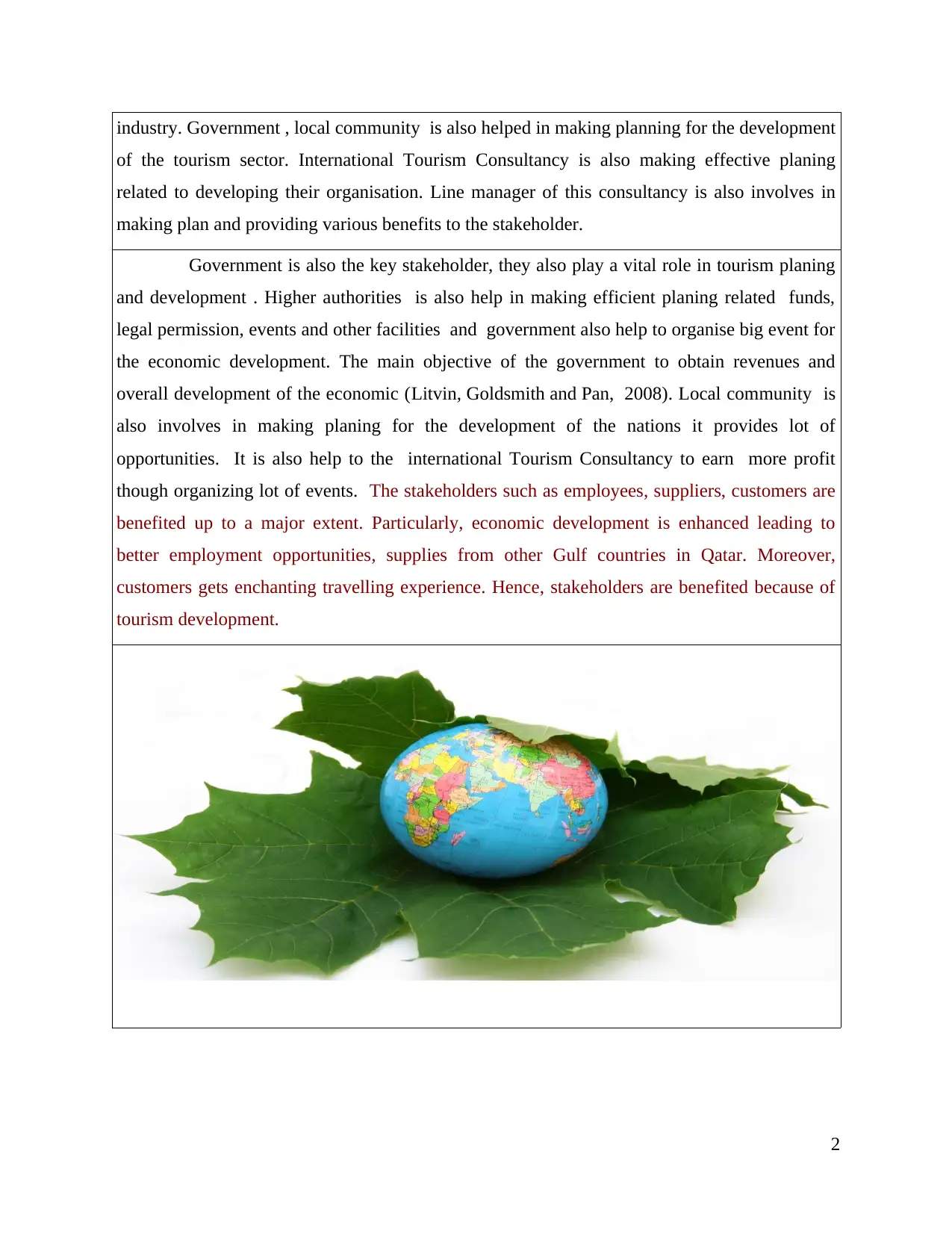
industry. Government , local community is also helped in making planning for the development
of the tourism sector. International Tourism Consultancy is also making effective planing
related to developing their organisation. Line manager of this consultancy is also involves in
making plan and providing various benefits to the stakeholder.
Government is also the key stakeholder, they also play a vital role in tourism planing
and development . Higher authorities is also help in making efficient planing related funds,
legal permission, events and other facilities and government also help to organise big event for
the economic development. The main objective of the government to obtain revenues and
overall development of the economic (Litvin, Goldsmith and Pan, 2008). Local community is
also involves in making planing for the development of the nations it provides lot of
opportunities. It is also help to the international Tourism Consultancy to earn more profit
though organizing lot of events. The stakeholders such as employees, suppliers, customers are
benefited up to a major extent. Particularly, economic development is enhanced leading to
better employment opportunities, supplies from other Gulf countries in Qatar. Moreover,
customers gets enchanting travelling experience. Hence, stakeholders are benefited because of
tourism development.
2
of the tourism sector. International Tourism Consultancy is also making effective planing
related to developing their organisation. Line manager of this consultancy is also involves in
making plan and providing various benefits to the stakeholder.
Government is also the key stakeholder, they also play a vital role in tourism planing
and development . Higher authorities is also help in making efficient planing related funds,
legal permission, events and other facilities and government also help to organise big event for
the economic development. The main objective of the government to obtain revenues and
overall development of the economic (Litvin, Goldsmith and Pan, 2008). Local community is
also involves in making planing for the development of the nations it provides lot of
opportunities. It is also help to the international Tourism Consultancy to earn more profit
though organizing lot of events. The stakeholders such as employees, suppliers, customers are
benefited up to a major extent. Particularly, economic development is enhanced leading to
better employment opportunities, supplies from other Gulf countries in Qatar. Moreover,
customers gets enchanting travelling experience. Hence, stakeholders are benefited because of
tourism development.
2
Paraphrase This Document
Need a fresh take? Get an instant paraphrase of this document with our AI Paraphraser
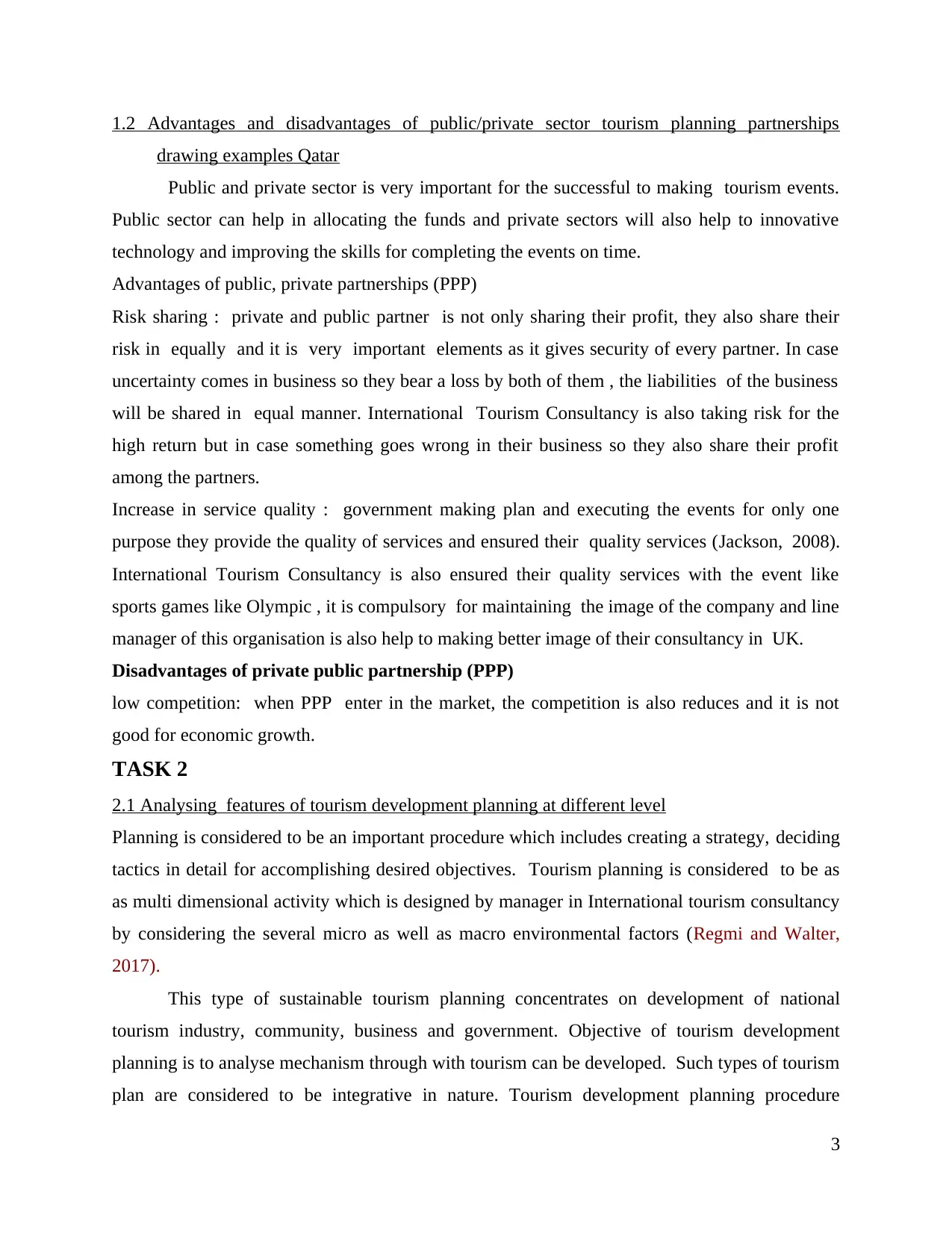
1.2 Advantages and disadvantages of public/private sector tourism planning partnerships
drawing examples Qatar
Public and private sector is very important for the successful to making tourism events.
Public sector can help in allocating the funds and private sectors will also help to innovative
technology and improving the skills for completing the events on time.
Advantages of public, private partnerships (PPP)
Risk sharing : private and public partner is not only sharing their profit, they also share their
risk in equally and it is very important elements as it gives security of every partner. In case
uncertainty comes in business so they bear a loss by both of them , the liabilities of the business
will be shared in equal manner. International Tourism Consultancy is also taking risk for the
high return but in case something goes wrong in their business so they also share their profit
among the partners.
Increase in service quality : government making plan and executing the events for only one
purpose they provide the quality of services and ensured their quality services (Jackson, 2008).
International Tourism Consultancy is also ensured their quality services with the event like
sports games like Olympic , it is compulsory for maintaining the image of the company and line
manager of this organisation is also help to making better image of their consultancy in UK.
Disadvantages of private public partnership (PPP)
low competition: when PPP enter in the market, the competition is also reduces and it is not
good for economic growth.
TASK 2
2.1 Analysing features of tourism development planning at different level
Planning is considered to be an important procedure which includes creating a strategy, deciding
tactics in detail for accomplishing desired objectives. Tourism planning is considered to be as
as multi dimensional activity which is designed by manager in International tourism consultancy
by considering the several micro as well as macro environmental factors (Regmi and Walter,
2017).
This type of sustainable tourism planning concentrates on development of national
tourism industry, community, business and government. Objective of tourism development
planning is to analyse mechanism through with tourism can be developed. Such types of tourism
plan are considered to be integrative in nature. Tourism development planning procedure
3
drawing examples Qatar
Public and private sector is very important for the successful to making tourism events.
Public sector can help in allocating the funds and private sectors will also help to innovative
technology and improving the skills for completing the events on time.
Advantages of public, private partnerships (PPP)
Risk sharing : private and public partner is not only sharing their profit, they also share their
risk in equally and it is very important elements as it gives security of every partner. In case
uncertainty comes in business so they bear a loss by both of them , the liabilities of the business
will be shared in equal manner. International Tourism Consultancy is also taking risk for the
high return but in case something goes wrong in their business so they also share their profit
among the partners.
Increase in service quality : government making plan and executing the events for only one
purpose they provide the quality of services and ensured their quality services (Jackson, 2008).
International Tourism Consultancy is also ensured their quality services with the event like
sports games like Olympic , it is compulsory for maintaining the image of the company and line
manager of this organisation is also help to making better image of their consultancy in UK.
Disadvantages of private public partnership (PPP)
low competition: when PPP enter in the market, the competition is also reduces and it is not
good for economic growth.
TASK 2
2.1 Analysing features of tourism development planning at different level
Planning is considered to be an important procedure which includes creating a strategy, deciding
tactics in detail for accomplishing desired objectives. Tourism planning is considered to be as
as multi dimensional activity which is designed by manager in International tourism consultancy
by considering the several micro as well as macro environmental factors (Regmi and Walter,
2017).
This type of sustainable tourism planning concentrates on development of national
tourism industry, community, business and government. Objective of tourism development
planning is to analyse mechanism through with tourism can be developed. Such types of tourism
plan are considered to be integrative in nature. Tourism development planning procedure
3
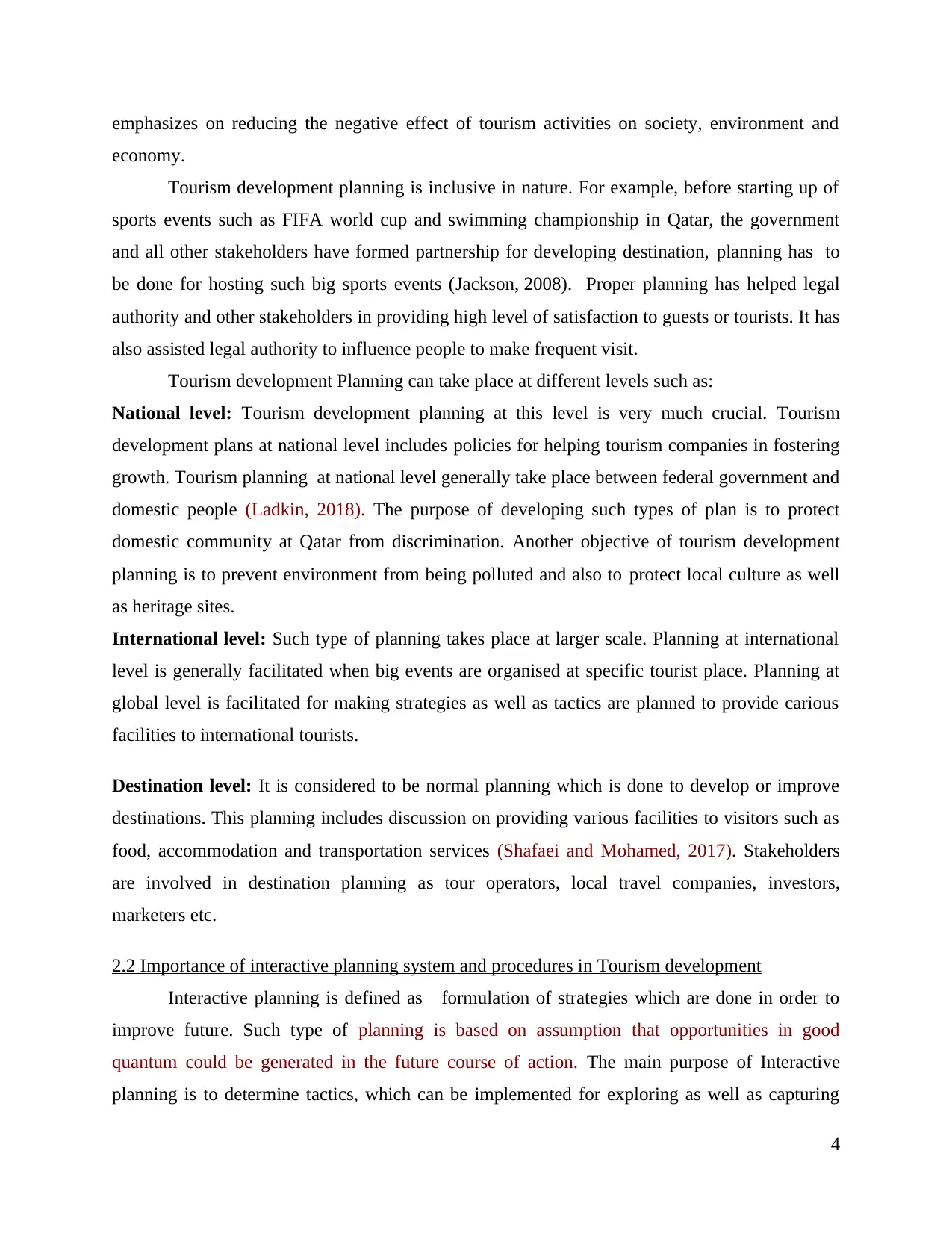
emphasizes on reducing the negative effect of tourism activities on society, environment and
economy.
Tourism development planning is inclusive in nature. For example, before starting up of
sports events such as FIFA world cup and swimming championship in Qatar, the government
and all other stakeholders have formed partnership for developing destination, planning has to
be done for hosting such big sports events (Jackson, 2008). Proper planning has helped legal
authority and other stakeholders in providing high level of satisfaction to guests or tourists. It has
also assisted legal authority to influence people to make frequent visit.
Tourism development Planning can take place at different levels such as:
National level: Tourism development planning at this level is very much crucial. Tourism
development plans at national level includes policies for helping tourism companies in fostering
growth. Tourism planning at national level generally take place between federal government and
domestic people (Ladkin, 2018). The purpose of developing such types of plan is to protect
domestic community at Qatar from discrimination. Another objective of tourism development
planning is to prevent environment from being polluted and also to protect local culture as well
as heritage sites.
International level: Such type of planning takes place at larger scale. Planning at international
level is generally facilitated when big events are organised at specific tourist place. Planning at
global level is facilitated for making strategies as well as tactics are planned to provide carious
facilities to international tourists.
Destination level: It is considered to be normal planning which is done to develop or improve
destinations. This planning includes discussion on providing various facilities to visitors such as
food, accommodation and transportation services (Shafaei and Mohamed, 2017). Stakeholders
are involved in destination planning as tour operators, local travel companies, investors,
marketers etc.
2.2 Importance of interactive planning system and procedures in Tourism development
Interactive planning is defined as formulation of strategies which are done in order to
improve future. Such type of planning is based on assumption that opportunities in good
quantum could be generated in the future course of action. The main purpose of Interactive
planning is to determine tactics, which can be implemented for exploring as well as capturing
4
economy.
Tourism development planning is inclusive in nature. For example, before starting up of
sports events such as FIFA world cup and swimming championship in Qatar, the government
and all other stakeholders have formed partnership for developing destination, planning has to
be done for hosting such big sports events (Jackson, 2008). Proper planning has helped legal
authority and other stakeholders in providing high level of satisfaction to guests or tourists. It has
also assisted legal authority to influence people to make frequent visit.
Tourism development Planning can take place at different levels such as:
National level: Tourism development planning at this level is very much crucial. Tourism
development plans at national level includes policies for helping tourism companies in fostering
growth. Tourism planning at national level generally take place between federal government and
domestic people (Ladkin, 2018). The purpose of developing such types of plan is to protect
domestic community at Qatar from discrimination. Another objective of tourism development
planning is to prevent environment from being polluted and also to protect local culture as well
as heritage sites.
International level: Such type of planning takes place at larger scale. Planning at international
level is generally facilitated when big events are organised at specific tourist place. Planning at
global level is facilitated for making strategies as well as tactics are planned to provide carious
facilities to international tourists.
Destination level: It is considered to be normal planning which is done to develop or improve
destinations. This planning includes discussion on providing various facilities to visitors such as
food, accommodation and transportation services (Shafaei and Mohamed, 2017). Stakeholders
are involved in destination planning as tour operators, local travel companies, investors,
marketers etc.
2.2 Importance of interactive planning system and procedures in Tourism development
Interactive planning is defined as formulation of strategies which are done in order to
improve future. Such type of planning is based on assumption that opportunities in good
quantum could be generated in the future course of action. The main purpose of Interactive
planning is to determine tactics, which can be implemented for exploring as well as capturing
4
⊘ This is a preview!⊘
Do you want full access?
Subscribe today to unlock all pages.

Trusted by 1+ million students worldwide
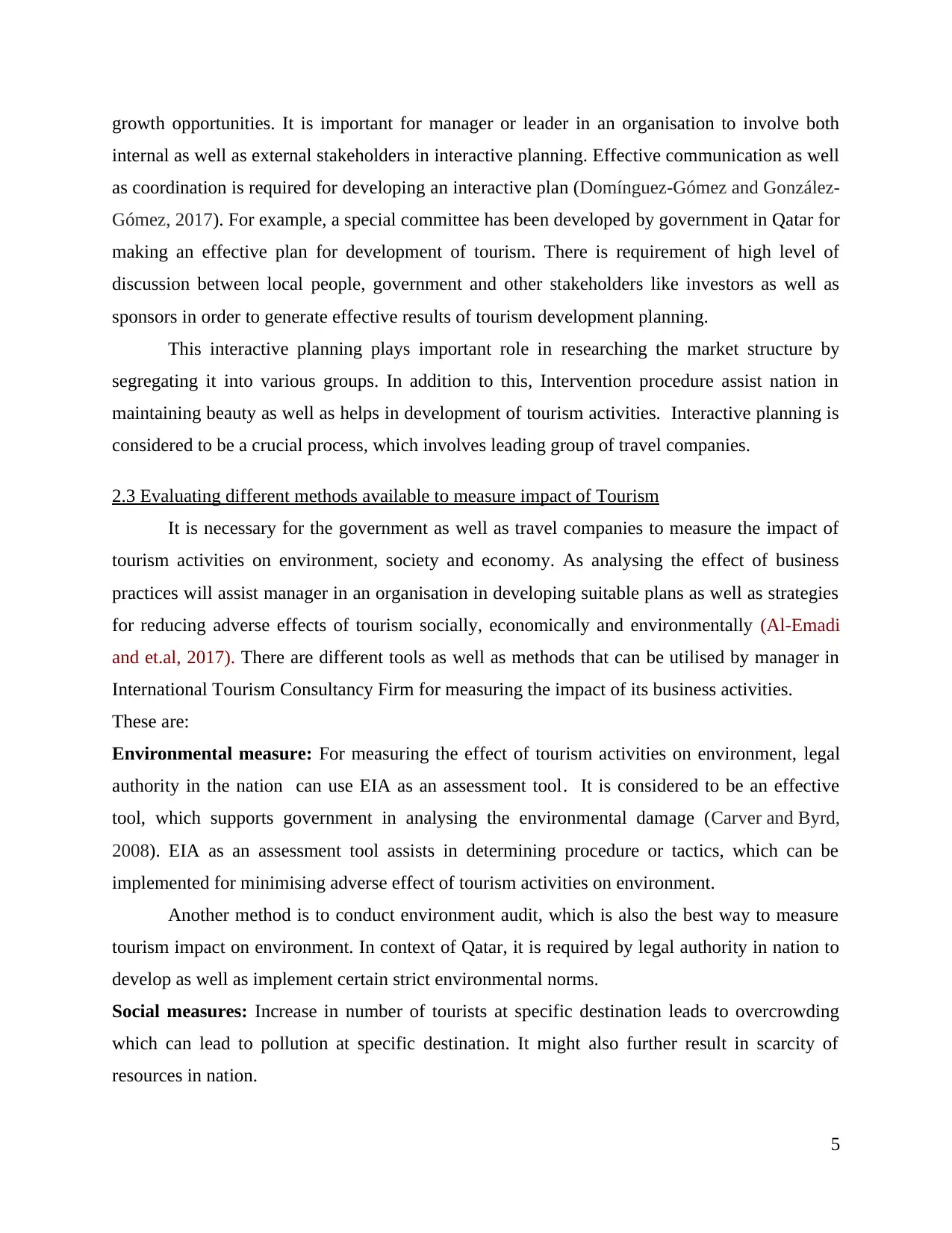
growth opportunities. It is important for manager or leader in an organisation to involve both
internal as well as external stakeholders in interactive planning. Effective communication as well
as coordination is required for developing an interactive plan (Domínguez-Gómez and González-
Gómez, 2017). For example, a special committee has been developed by government in Qatar for
making an effective plan for development of tourism. There is requirement of high level of
discussion between local people, government and other stakeholders like investors as well as
sponsors in order to generate effective results of tourism development planning.
This interactive planning plays important role in researching the market structure by
segregating it into various groups. In addition to this, Intervention procedure assist nation in
maintaining beauty as well as helps in development of tourism activities. Interactive planning is
considered to be a crucial process, which involves leading group of travel companies.
2.3 Evaluating different methods available to measure impact of Tourism
It is necessary for the government as well as travel companies to measure the impact of
tourism activities on environment, society and economy. As analysing the effect of business
practices will assist manager in an organisation in developing suitable plans as well as strategies
for reducing adverse effects of tourism socially, economically and environmentally (Al-Emadi
and et.al, 2017). There are different tools as well as methods that can be utilised by manager in
International Tourism Consultancy Firm for measuring the impact of its business activities.
These are:
Environmental measure: For measuring the effect of tourism activities on environment, legal
authority in the nation can use EIA as an assessment tool. It is considered to be an effective
tool, which supports government in analysing the environmental damage (Carver and Byrd,
2008). EIA as an assessment tool assists in determining procedure or tactics, which can be
implemented for minimising adverse effect of tourism activities on environment.
Another method is to conduct environment audit, which is also the best way to measure
tourism impact on environment. In context of Qatar, it is required by legal authority in nation to
develop as well as implement certain strict environmental norms.
Social measures: Increase in number of tourists at specific destination leads to overcrowding
which can lead to pollution at specific destination. It might also further result in scarcity of
resources in nation.
5
internal as well as external stakeholders in interactive planning. Effective communication as well
as coordination is required for developing an interactive plan (Domínguez-Gómez and González-
Gómez, 2017). For example, a special committee has been developed by government in Qatar for
making an effective plan for development of tourism. There is requirement of high level of
discussion between local people, government and other stakeholders like investors as well as
sponsors in order to generate effective results of tourism development planning.
This interactive planning plays important role in researching the market structure by
segregating it into various groups. In addition to this, Intervention procedure assist nation in
maintaining beauty as well as helps in development of tourism activities. Interactive planning is
considered to be a crucial process, which involves leading group of travel companies.
2.3 Evaluating different methods available to measure impact of Tourism
It is necessary for the government as well as travel companies to measure the impact of
tourism activities on environment, society and economy. As analysing the effect of business
practices will assist manager in an organisation in developing suitable plans as well as strategies
for reducing adverse effects of tourism socially, economically and environmentally (Al-Emadi
and et.al, 2017). There are different tools as well as methods that can be utilised by manager in
International Tourism Consultancy Firm for measuring the impact of its business activities.
These are:
Environmental measure: For measuring the effect of tourism activities on environment, legal
authority in the nation can use EIA as an assessment tool. It is considered to be an effective
tool, which supports government in analysing the environmental damage (Carver and Byrd,
2008). EIA as an assessment tool assists in determining procedure or tactics, which can be
implemented for minimising adverse effect of tourism activities on environment.
Another method is to conduct environment audit, which is also the best way to measure
tourism impact on environment. In context of Qatar, it is required by legal authority in nation to
develop as well as implement certain strict environmental norms.
Social measures: Increase in number of tourists at specific destination leads to overcrowding
which can lead to pollution at specific destination. It might also further result in scarcity of
resources in nation.
5
Paraphrase This Document
Need a fresh take? Get an instant paraphrase of this document with our AI Paraphraser
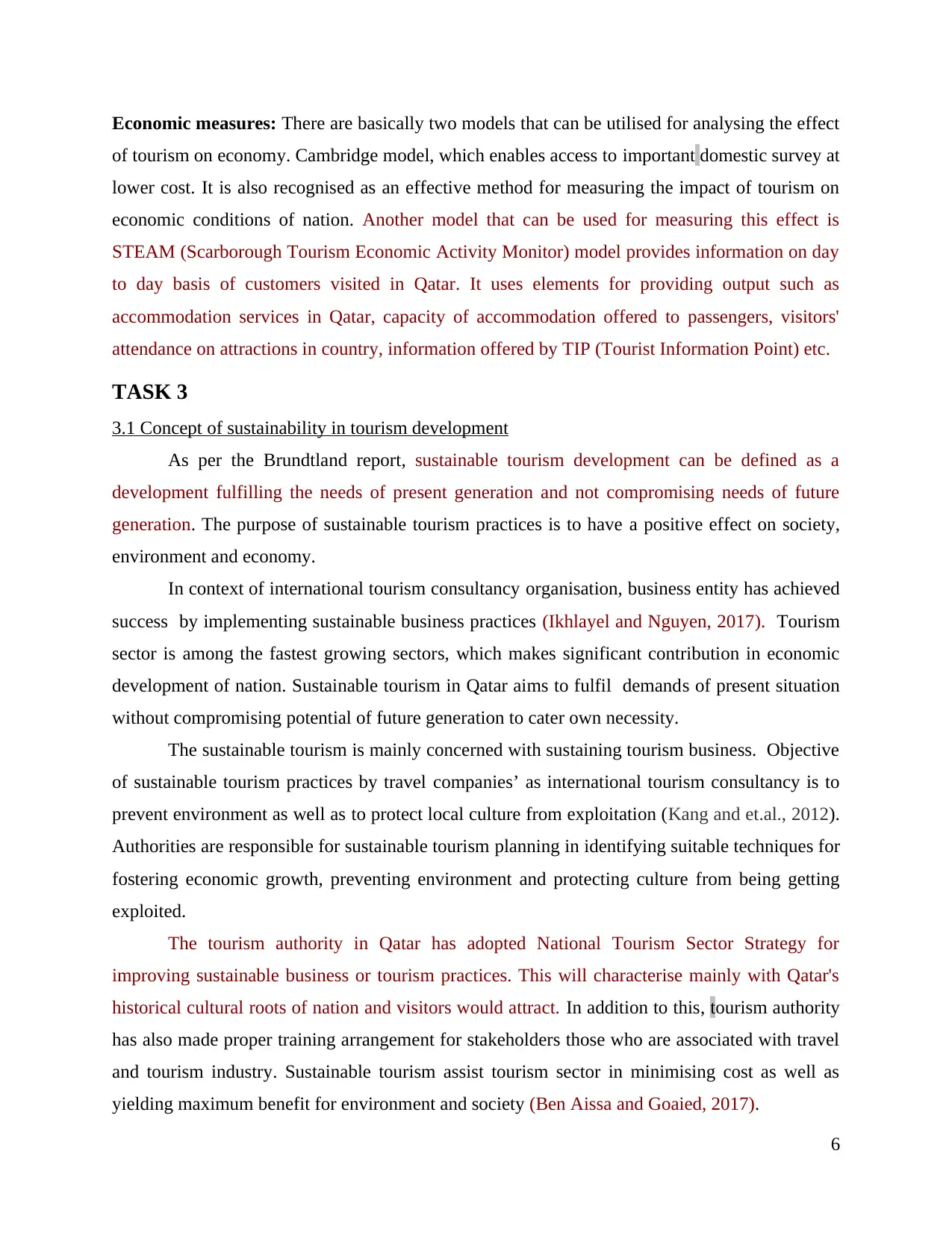
Economic measures: There are basically two models that can be utilised for analysing the effect
of tourism on economy. Cambridge model, which enables access to important domestic survey at
lower cost. It is also recognised as an effective method for measuring the impact of tourism on
economic conditions of nation. Another model that can be used for measuring this effect is
STEAM (Scarborough Tourism Economic Activity Monitor) model provides information on day
to day basis of customers visited in Qatar. It uses elements for providing output such as
accommodation services in Qatar, capacity of accommodation offered to passengers, visitors'
attendance on attractions in country, information offered by TIP (Tourist Information Point) etc.
TASK 3
3.1 Concept of sustainability in tourism development
As per the Brundtland report, sustainable tourism development can be defined as a
development fulfilling the needs of present generation and not compromising needs of future
generation. The purpose of sustainable tourism practices is to have a positive effect on society,
environment and economy.
In context of international tourism consultancy organisation, business entity has achieved
success by implementing sustainable business practices (Ikhlayel and Nguyen, 2017). Tourism
sector is among the fastest growing sectors, which makes significant contribution in economic
development of nation. Sustainable tourism in Qatar aims to fulfil demands of present situation
without compromising potential of future generation to cater own necessity.
The sustainable tourism is mainly concerned with sustaining tourism business. Objective
of sustainable tourism practices by travel companies’ as international tourism consultancy is to
prevent environment as well as to protect local culture from exploitation (Kang and et.al., 2012).
Authorities are responsible for sustainable tourism planning in identifying suitable techniques for
fostering economic growth, preventing environment and protecting culture from being getting
exploited.
The tourism authority in Qatar has adopted National Tourism Sector Strategy for
improving sustainable business or tourism practices. This will characterise mainly with Qatar's
historical cultural roots of nation and visitors would attract. In addition to this, tourism authority
has also made proper training arrangement for stakeholders those who are associated with travel
and tourism industry. Sustainable tourism assist tourism sector in minimising cost as well as
yielding maximum benefit for environment and society (Ben Aissa and Goaied, 2017).
6
of tourism on economy. Cambridge model, which enables access to important domestic survey at
lower cost. It is also recognised as an effective method for measuring the impact of tourism on
economic conditions of nation. Another model that can be used for measuring this effect is
STEAM (Scarborough Tourism Economic Activity Monitor) model provides information on day
to day basis of customers visited in Qatar. It uses elements for providing output such as
accommodation services in Qatar, capacity of accommodation offered to passengers, visitors'
attendance on attractions in country, information offered by TIP (Tourist Information Point) etc.
TASK 3
3.1 Concept of sustainability in tourism development
As per the Brundtland report, sustainable tourism development can be defined as a
development fulfilling the needs of present generation and not compromising needs of future
generation. The purpose of sustainable tourism practices is to have a positive effect on society,
environment and economy.
In context of international tourism consultancy organisation, business entity has achieved
success by implementing sustainable business practices (Ikhlayel and Nguyen, 2017). Tourism
sector is among the fastest growing sectors, which makes significant contribution in economic
development of nation. Sustainable tourism in Qatar aims to fulfil demands of present situation
without compromising potential of future generation to cater own necessity.
The sustainable tourism is mainly concerned with sustaining tourism business. Objective
of sustainable tourism practices by travel companies’ as international tourism consultancy is to
prevent environment as well as to protect local culture from exploitation (Kang and et.al., 2012).
Authorities are responsible for sustainable tourism planning in identifying suitable techniques for
fostering economic growth, preventing environment and protecting culture from being getting
exploited.
The tourism authority in Qatar has adopted National Tourism Sector Strategy for
improving sustainable business or tourism practices. This will characterise mainly with Qatar's
historical cultural roots of nation and visitors would attract. In addition to this, tourism authority
has also made proper training arrangement for stakeholders those who are associated with travel
and tourism industry. Sustainable tourism assist tourism sector in minimising cost as well as
yielding maximum benefit for environment and society (Ben Aissa and Goaied, 2017).
6
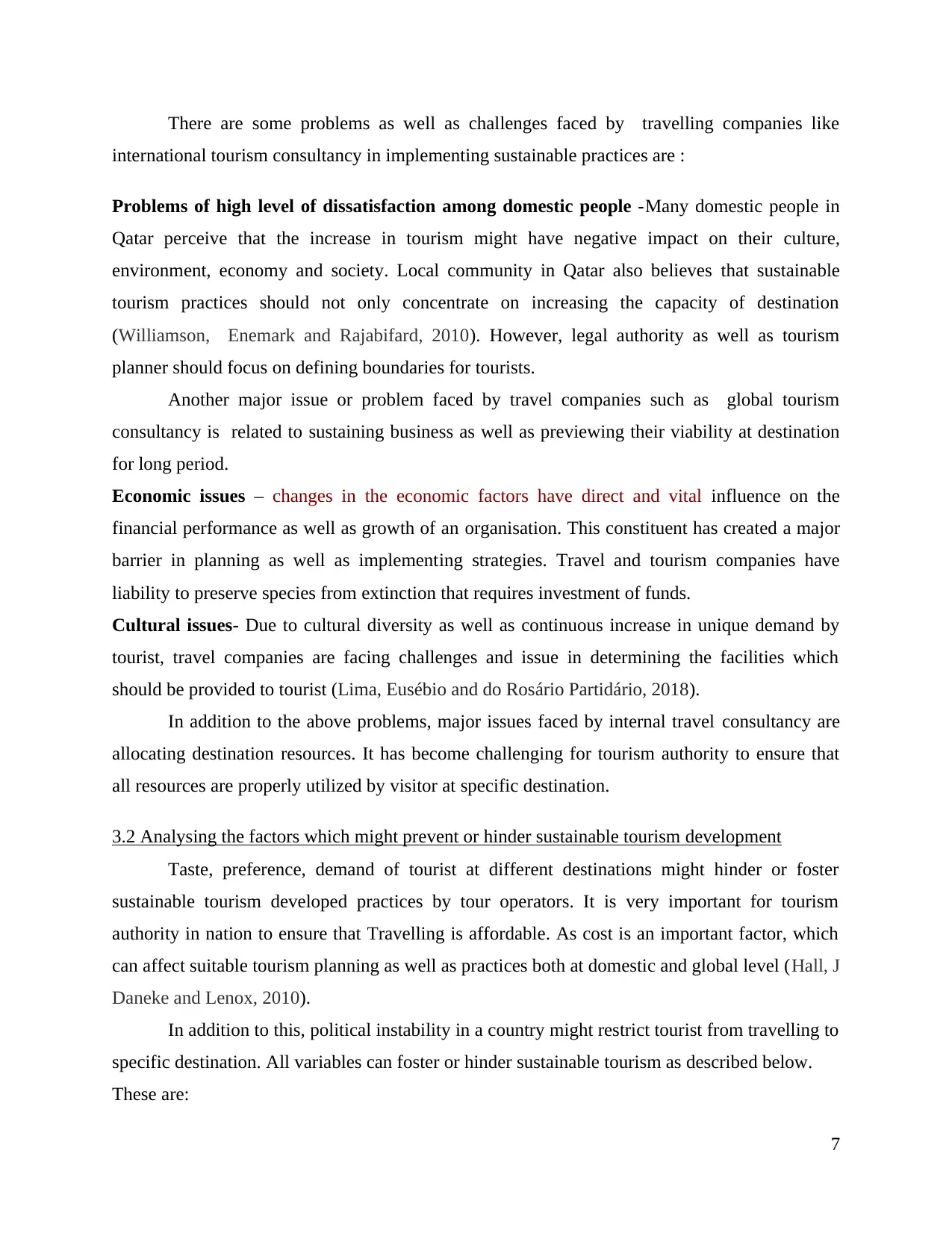
There are some problems as well as challenges faced by travelling companies like
international tourism consultancy in implementing sustainable practices are :
Problems of high level of dissatisfaction among domestic people -Many domestic people in
Qatar perceive that the increase in tourism might have negative impact on their culture,
environment, economy and society. Local community in Qatar also believes that sustainable
tourism practices should not only concentrate on increasing the capacity of destination
(Williamson, Enemark and Rajabifard, 2010). However, legal authority as well as tourism
planner should focus on defining boundaries for tourists.
Another major issue or problem faced by travel companies such as global tourism
consultancy is related to sustaining business as well as previewing their viability at destination
for long period.
Economic issues – changes in the economic factors have direct and vital influence on the
financial performance as well as growth of an organisation. This constituent has created a major
barrier in planning as well as implementing strategies. Travel and tourism companies have
liability to preserve species from extinction that requires investment of funds.
Cultural issues- Due to cultural diversity as well as continuous increase in unique demand by
tourist, travel companies are facing challenges and issue in determining the facilities which
should be provided to tourist (Lima, Eusébio and do Rosário Partidário, 2018).
In addition to the above problems, major issues faced by internal travel consultancy are
allocating destination resources. It has become challenging for tourism authority to ensure that
all resources are properly utilized by visitor at specific destination.
3.2 Analysing the factors which might prevent or hinder sustainable tourism development
Taste, preference, demand of tourist at different destinations might hinder or foster
sustainable tourism developed practices by tour operators. It is very important for tourism
authority in nation to ensure that Travelling is affordable. As cost is an important factor, which
can affect suitable tourism planning as well as practices both at domestic and global level (Hall, J
Daneke and Lenox, 2010).
In addition to this, political instability in a country might restrict tourist from travelling to
specific destination. All variables can foster or hinder sustainable tourism as described below.
These are:
7
international tourism consultancy in implementing sustainable practices are :
Problems of high level of dissatisfaction among domestic people -Many domestic people in
Qatar perceive that the increase in tourism might have negative impact on their culture,
environment, economy and society. Local community in Qatar also believes that sustainable
tourism practices should not only concentrate on increasing the capacity of destination
(Williamson, Enemark and Rajabifard, 2010). However, legal authority as well as tourism
planner should focus on defining boundaries for tourists.
Another major issue or problem faced by travel companies such as global tourism
consultancy is related to sustaining business as well as previewing their viability at destination
for long period.
Economic issues – changes in the economic factors have direct and vital influence on the
financial performance as well as growth of an organisation. This constituent has created a major
barrier in planning as well as implementing strategies. Travel and tourism companies have
liability to preserve species from extinction that requires investment of funds.
Cultural issues- Due to cultural diversity as well as continuous increase in unique demand by
tourist, travel companies are facing challenges and issue in determining the facilities which
should be provided to tourist (Lima, Eusébio and do Rosário Partidário, 2018).
In addition to the above problems, major issues faced by internal travel consultancy are
allocating destination resources. It has become challenging for tourism authority to ensure that
all resources are properly utilized by visitor at specific destination.
3.2 Analysing the factors which might prevent or hinder sustainable tourism development
Taste, preference, demand of tourist at different destinations might hinder or foster
sustainable tourism developed practices by tour operators. It is very important for tourism
authority in nation to ensure that Travelling is affordable. As cost is an important factor, which
can affect suitable tourism planning as well as practices both at domestic and global level (Hall, J
Daneke and Lenox, 2010).
In addition to this, political instability in a country might restrict tourist from travelling to
specific destination. All variables can foster or hinder sustainable tourism as described below.
These are:
7
⊘ This is a preview!⊘
Do you want full access?
Subscribe today to unlock all pages.

Trusted by 1+ million students worldwide
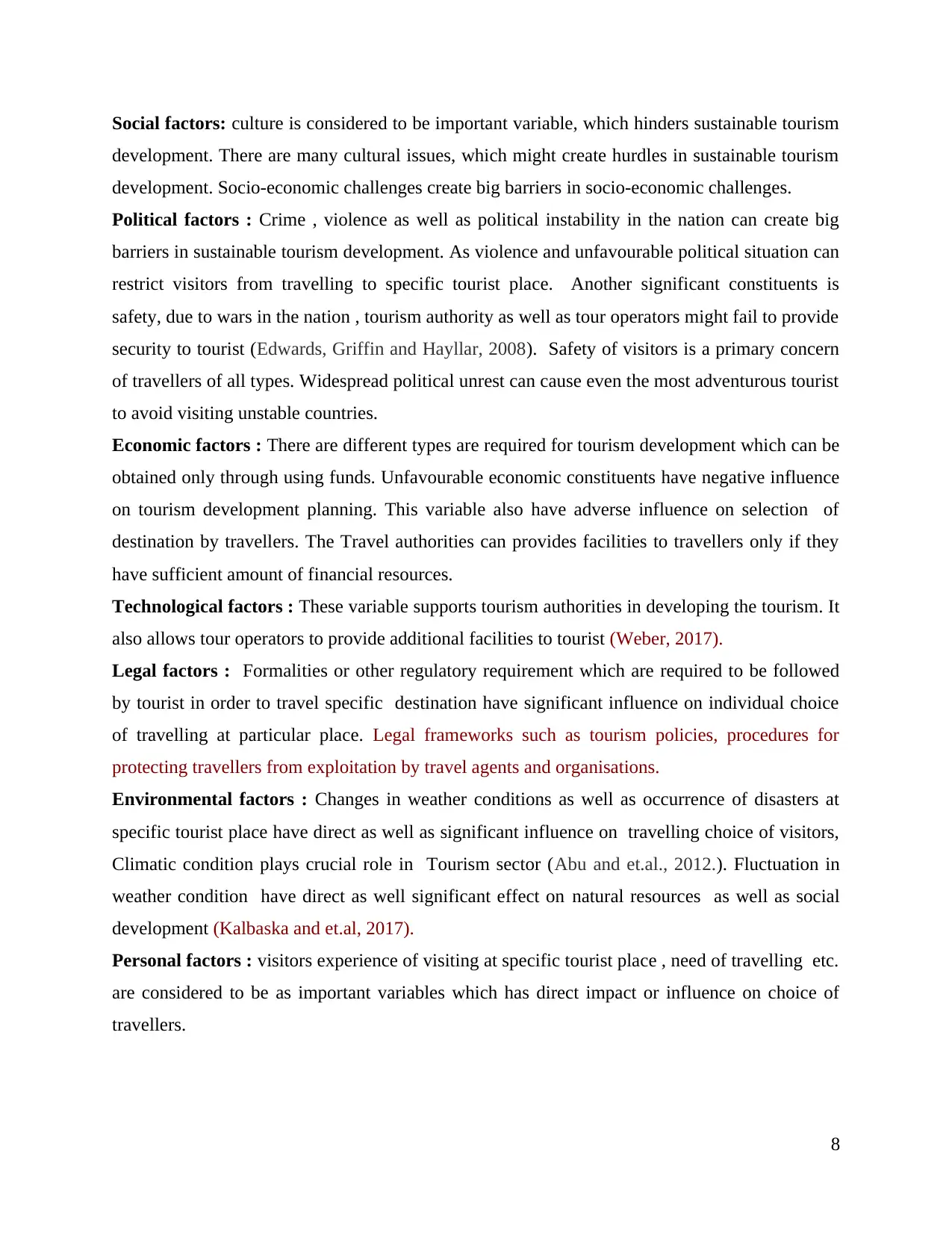
Social factors: culture is considered to be important variable, which hinders sustainable tourism
development. There are many cultural issues, which might create hurdles in sustainable tourism
development. Socio-economic challenges create big barriers in socio-economic challenges.
Political factors : Crime , violence as well as political instability in the nation can create big
barriers in sustainable tourism development. As violence and unfavourable political situation can
restrict visitors from travelling to specific tourist place. Another significant constituents is
safety, due to wars in the nation , tourism authority as well as tour operators might fail to provide
security to tourist (Edwards, Griffin and Hayllar, 2008). Safety of visitors is a primary concern
of travellers of all types. Widespread political unrest can cause even the most adventurous tourist
to avoid visiting unstable countries.
Economic factors : There are different types are required for tourism development which can be
obtained only through using funds. Unfavourable economic constituents have negative influence
on tourism development planning. This variable also have adverse influence on selection of
destination by travellers. The Travel authorities can provides facilities to travellers only if they
have sufficient amount of financial resources.
Technological factors : These variable supports tourism authorities in developing the tourism. It
also allows tour operators to provide additional facilities to tourist (Weber, 2017).
Legal factors : Formalities or other regulatory requirement which are required to be followed
by tourist in order to travel specific destination have significant influence on individual choice
of travelling at particular place. Legal frameworks such as tourism policies, procedures for
protecting travellers from exploitation by travel agents and organisations.
Environmental factors : Changes in weather conditions as well as occurrence of disasters at
specific tourist place have direct as well as significant influence on travelling choice of visitors,
Climatic condition plays crucial role in Tourism sector (Abu and et.al., 2012.). Fluctuation in
weather condition have direct as well significant effect on natural resources as well as social
development (Kalbaska and et.al, 2017).
Personal factors : visitors experience of visiting at specific tourist place , need of travelling etc.
are considered to be as important variables which has direct impact or influence on choice of
travellers.
8
development. There are many cultural issues, which might create hurdles in sustainable tourism
development. Socio-economic challenges create big barriers in socio-economic challenges.
Political factors : Crime , violence as well as political instability in the nation can create big
barriers in sustainable tourism development. As violence and unfavourable political situation can
restrict visitors from travelling to specific tourist place. Another significant constituents is
safety, due to wars in the nation , tourism authority as well as tour operators might fail to provide
security to tourist (Edwards, Griffin and Hayllar, 2008). Safety of visitors is a primary concern
of travellers of all types. Widespread political unrest can cause even the most adventurous tourist
to avoid visiting unstable countries.
Economic factors : There are different types are required for tourism development which can be
obtained only through using funds. Unfavourable economic constituents have negative influence
on tourism development planning. This variable also have adverse influence on selection of
destination by travellers. The Travel authorities can provides facilities to travellers only if they
have sufficient amount of financial resources.
Technological factors : These variable supports tourism authorities in developing the tourism. It
also allows tour operators to provide additional facilities to tourist (Weber, 2017).
Legal factors : Formalities or other regulatory requirement which are required to be followed
by tourist in order to travel specific destination have significant influence on individual choice
of travelling at particular place. Legal frameworks such as tourism policies, procedures for
protecting travellers from exploitation by travel agents and organisations.
Environmental factors : Changes in weather conditions as well as occurrence of disasters at
specific tourist place have direct as well as significant influence on travelling choice of visitors,
Climatic condition plays crucial role in Tourism sector (Abu and et.al., 2012.). Fluctuation in
weather condition have direct as well significant effect on natural resources as well as social
development (Kalbaska and et.al, 2017).
Personal factors : visitors experience of visiting at specific tourist place , need of travelling etc.
are considered to be as important variables which has direct impact or influence on choice of
travellers.
8
Paraphrase This Document
Need a fresh take? Get an instant paraphrase of this document with our AI Paraphraser
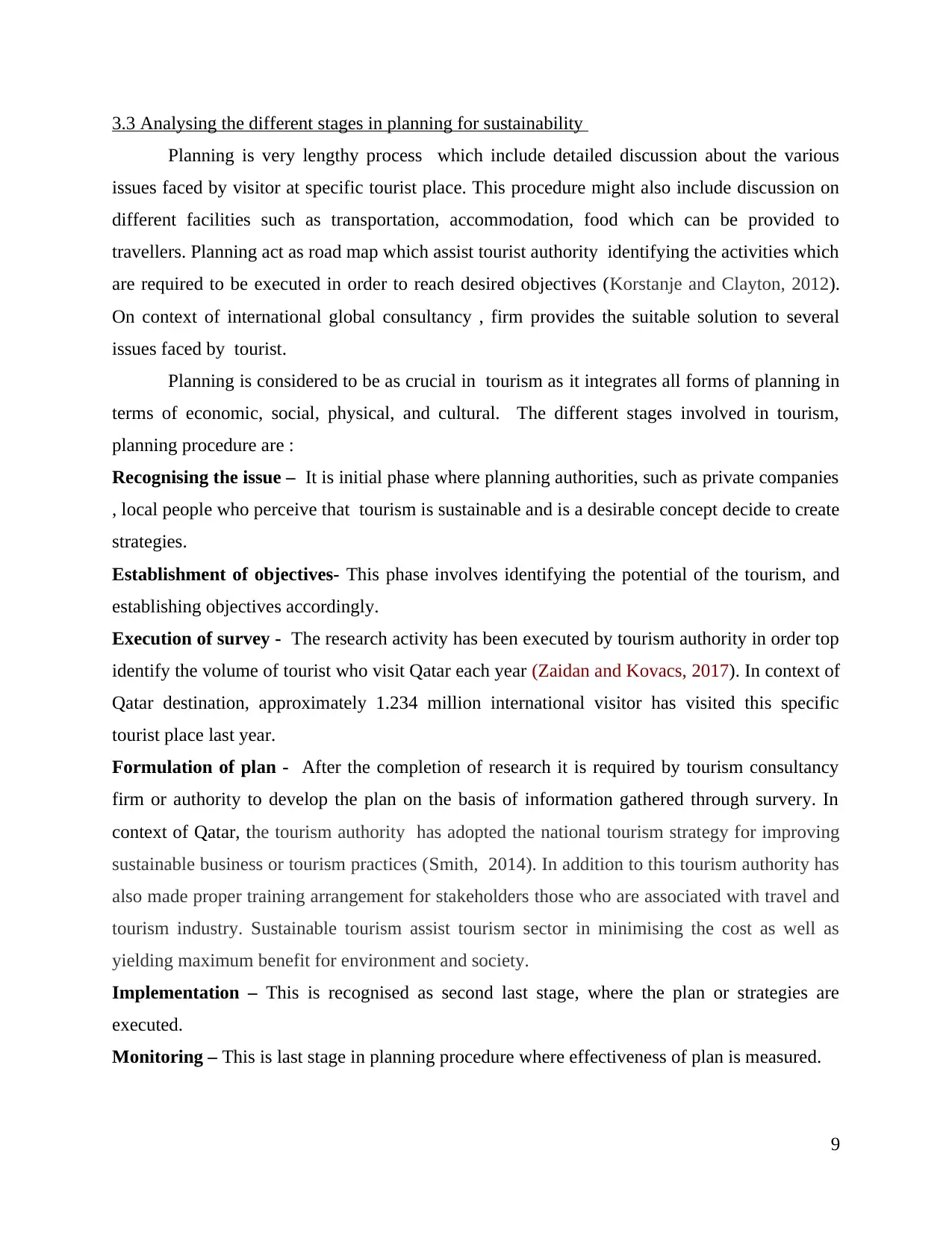
3.3 Analysing the different stages in planning for sustainability
Planning is very lengthy process which include detailed discussion about the various
issues faced by visitor at specific tourist place. This procedure might also include discussion on
different facilities such as transportation, accommodation, food which can be provided to
travellers. Planning act as road map which assist tourist authority identifying the activities which
are required to be executed in order to reach desired objectives (Korstanje and Clayton, 2012).
On context of international global consultancy , firm provides the suitable solution to several
issues faced by tourist.
Planning is considered to be as crucial in tourism as it integrates all forms of planning in
terms of economic, social, physical, and cultural. The different stages involved in tourism,
planning procedure are :
Recognising the issue – It is initial phase where planning authorities, such as private companies
, local people who perceive that tourism is sustainable and is a desirable concept decide to create
strategies.
Establishment of objectives- This phase involves identifying the potential of the tourism, and
establishing objectives accordingly.
Execution of survey - The research activity has been executed by tourism authority in order top
identify the volume of tourist who visit Qatar each year (Zaidan and Kovacs, 2017). In context of
Qatar destination, approximately 1.234 million international visitor has visited this specific
tourist place last year.
Formulation of plan - After the completion of research it is required by tourism consultancy
firm or authority to develop the plan on the basis of information gathered through survery. In
context of Qatar, the tourism authority has adopted the national tourism strategy for improving
sustainable business or tourism practices (Smith, 2014). In addition to this tourism authority has
also made proper training arrangement for stakeholders those who are associated with travel and
tourism industry. Sustainable tourism assist tourism sector in minimising the cost as well as
yielding maximum benefit for environment and society.
Implementation – This is recognised as second last stage, where the plan or strategies are
executed.
Monitoring – This is last stage in planning procedure where effectiveness of plan is measured.
9
Planning is very lengthy process which include detailed discussion about the various
issues faced by visitor at specific tourist place. This procedure might also include discussion on
different facilities such as transportation, accommodation, food which can be provided to
travellers. Planning act as road map which assist tourist authority identifying the activities which
are required to be executed in order to reach desired objectives (Korstanje and Clayton, 2012).
On context of international global consultancy , firm provides the suitable solution to several
issues faced by tourist.
Planning is considered to be as crucial in tourism as it integrates all forms of planning in
terms of economic, social, physical, and cultural. The different stages involved in tourism,
planning procedure are :
Recognising the issue – It is initial phase where planning authorities, such as private companies
, local people who perceive that tourism is sustainable and is a desirable concept decide to create
strategies.
Establishment of objectives- This phase involves identifying the potential of the tourism, and
establishing objectives accordingly.
Execution of survey - The research activity has been executed by tourism authority in order top
identify the volume of tourist who visit Qatar each year (Zaidan and Kovacs, 2017). In context of
Qatar destination, approximately 1.234 million international visitor has visited this specific
tourist place last year.
Formulation of plan - After the completion of research it is required by tourism consultancy
firm or authority to develop the plan on the basis of information gathered through survery. In
context of Qatar, the tourism authority has adopted the national tourism strategy for improving
sustainable business or tourism practices (Smith, 2014). In addition to this tourism authority has
also made proper training arrangement for stakeholders those who are associated with travel and
tourism industry. Sustainable tourism assist tourism sector in minimising the cost as well as
yielding maximum benefit for environment and society.
Implementation – This is recognised as second last stage, where the plan or strategies are
executed.
Monitoring – This is last stage in planning procedure where effectiveness of plan is measured.
9
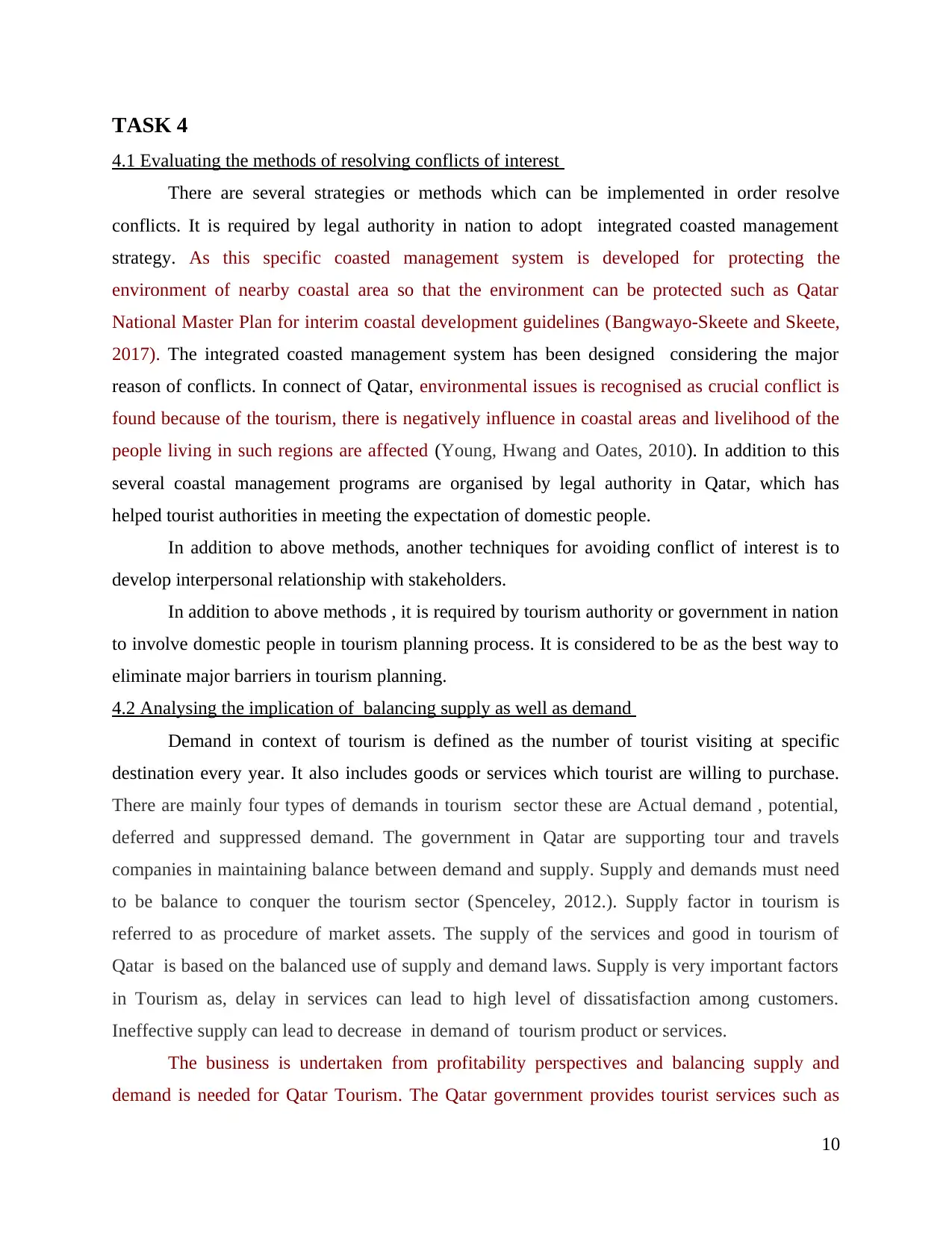
TASK 4
4.1 Evaluating the methods of resolving conflicts of interest
There are several strategies or methods which can be implemented in order resolve
conflicts. It is required by legal authority in nation to adopt integrated coasted management
strategy. As this specific coasted management system is developed for protecting the
environment of nearby coastal area so that the environment can be protected such as Qatar
National Master Plan for interim coastal development guidelines (Bangwayo-Skeete and Skeete,
2017). The integrated coasted management system has been designed considering the major
reason of conflicts. In connect of Qatar, environmental issues is recognised as crucial conflict is
found because of the tourism, there is negatively influence in coastal areas and livelihood of the
people living in such regions are affected (Young, Hwang and Oates, 2010). In addition to this
several coastal management programs are organised by legal authority in Qatar, which has
helped tourist authorities in meeting the expectation of domestic people.
In addition to above methods, another techniques for avoiding conflict of interest is to
develop interpersonal relationship with stakeholders.
In addition to above methods , it is required by tourism authority or government in nation
to involve domestic people in tourism planning process. It is considered to be as the best way to
eliminate major barriers in tourism planning.
4.2 Analysing the implication of balancing supply as well as demand
Demand in context of tourism is defined as the number of tourist visiting at specific
destination every year. It also includes goods or services which tourist are willing to purchase.
There are mainly four types of demands in tourism sector these are Actual demand , potential,
deferred and suppressed demand. The government in Qatar are supporting tour and travels
companies in maintaining balance between demand and supply. Supply and demands must need
to be balance to conquer the tourism sector (Spenceley, 2012.). Supply factor in tourism is
referred to as procedure of market assets. The supply of the services and good in tourism of
Qatar is based on the balanced use of supply and demand laws. Supply is very important factors
in Tourism as, delay in services can lead to high level of dissatisfaction among customers.
Ineffective supply can lead to decrease in demand of tourism product or services.
The business is undertaken from profitability perspectives and balancing supply and
demand is needed for Qatar Tourism. The Qatar government provides tourist services such as
10
4.1 Evaluating the methods of resolving conflicts of interest
There are several strategies or methods which can be implemented in order resolve
conflicts. It is required by legal authority in nation to adopt integrated coasted management
strategy. As this specific coasted management system is developed for protecting the
environment of nearby coastal area so that the environment can be protected such as Qatar
National Master Plan for interim coastal development guidelines (Bangwayo-Skeete and Skeete,
2017). The integrated coasted management system has been designed considering the major
reason of conflicts. In connect of Qatar, environmental issues is recognised as crucial conflict is
found because of the tourism, there is negatively influence in coastal areas and livelihood of the
people living in such regions are affected (Young, Hwang and Oates, 2010). In addition to this
several coastal management programs are organised by legal authority in Qatar, which has
helped tourist authorities in meeting the expectation of domestic people.
In addition to above methods, another techniques for avoiding conflict of interest is to
develop interpersonal relationship with stakeholders.
In addition to above methods , it is required by tourism authority or government in nation
to involve domestic people in tourism planning process. It is considered to be as the best way to
eliminate major barriers in tourism planning.
4.2 Analysing the implication of balancing supply as well as demand
Demand in context of tourism is defined as the number of tourist visiting at specific
destination every year. It also includes goods or services which tourist are willing to purchase.
There are mainly four types of demands in tourism sector these are Actual demand , potential,
deferred and suppressed demand. The government in Qatar are supporting tour and travels
companies in maintaining balance between demand and supply. Supply and demands must need
to be balance to conquer the tourism sector (Spenceley, 2012.). Supply factor in tourism is
referred to as procedure of market assets. The supply of the services and good in tourism of
Qatar is based on the balanced use of supply and demand laws. Supply is very important factors
in Tourism as, delay in services can lead to high level of dissatisfaction among customers.
Ineffective supply can lead to decrease in demand of tourism product or services.
The business is undertaken from profitability perspectives and balancing supply and
demand is needed for Qatar Tourism. The Qatar government provides tourist services such as
10
⊘ This is a preview!⊘
Do you want full access?
Subscribe today to unlock all pages.

Trusted by 1+ million students worldwide
1 out of 19
Related Documents
Your All-in-One AI-Powered Toolkit for Academic Success.
+13062052269
info@desklib.com
Available 24*7 on WhatsApp / Email
![[object Object]](/_next/static/media/star-bottom.7253800d.svg)
Unlock your academic potential
Copyright © 2020–2026 A2Z Services. All Rights Reserved. Developed and managed by ZUCOL.




